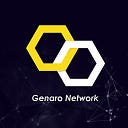Genaro Network — Decentralized Storage in the Web 3.0 Era
Data has become an important strategic resource for corporations, most notably so as the world undergoes an increasing level of digitization. Countless bit of data is being created every day, and the storage market is expanding at a rapid rate. According to statistics, the global cloud storage market is poised to exceed $1 trillion in scale some time from 2020 to 2025.
The current storage market is divided into two major categories: centralized storage solutions under Web 2.0, and decentralized storage solutions under Web 3.0. With regards to these two categories, most users would compare them in a similar manner to the way 5G has rendered 4G obsolete. However, there are fundamental differences in storage methods between Web 3.0 and Web 2.0, and we will seek to analyze them in this article.
Web 2.0 storage mostly refers to the centralized storage technology used by enterprises, and their popularity has brought about many problems. These problems include: data leaks, server failure, centralized operational control, selling of user data, hacking incidents, and so on.
Nowadays, creating a safe, stable and low-cost data storage solution has become a top priority in the current market. Developers such as Genaro Network (Genaro) have now entered the fray to accelerate the development of decentralized storage in the Web 3.0 era.
Features of Genaro Network
1. Reliability
Blockchain uses something called distributed ledger technology (DLT), which is a protocol that copies and distribute data throughout the network. Cloud storage solutions built on the blockchain has the characteristics of decentralization and encryption under cryptography, which is the key towards building a reliable and decentralized data storage solution.
In the Genaro Network, any storage or modification of data must be verified by the nodes within the network to prevent data from being illegally tampered with. Its storage solution can achieve load balancing, preventing data traffic from being concentrated in a single location, which may reduce the speed of data storage and retrieval. Because it stores multiple copies of the original data in multiple locations, the integrity of the original data will be preserved even if a single node goes offline.
2. High Efficiency
Genaro replaces the traditional storage method of keeping data in centralized servers, opting instead to split data into blocks, then store them in multiple nodes throughout the network. Similar blocks will also be stored in different nodes to maintain redundancy. Genaro will automatically use the node closest to the user to make data storage more efficient.
3. Security
Each piece of data in the Genaro Network is encrypted, fragmented, and redundantly stored in nodes. Similar to cryptocurrencies, only those who hold the private key can access the data, then decrypt and view the data. Since the original data is stored in a distributed manner across the entire network, hackers who manage to take over a node can only gain access to a portion of the data, and not the whole.
4. Scalability
The number of nodes in the Genaro Network can be expanded indefinitely, and each node can also flexibly adjust their storage capacity accordingly.
5. Fairness
With the emergence of millions of users in the Genaro Network, competition within the market will bring about fairness and transparency. The cost of data storage will not be controlled by powerful centralized entities. This way, the market can get fairer pricing, and storage providers will be incentivized to provide services that are of a higher quality to compete with each other.
Introduction to Genaro Network
The Genaro Network is the first smart data ecosystem with a Dual-Strata Architecture, integrating a public blockchain with decentralized storage. Genaro pioneered the combination of SPoR (Sentinel Proof of Retrievability) with PoS (Proof of Stake) to form a new consensus mechanism, ensuring stronger performance, better security and a more sustainable blockchain infrastructure. Genaro provides developers with a one-stop platform to deploy smart contracts and store the data needed by DApps simultaneously. Genaro Network’s mission is to ensure the secure migration of the core Internet infrastructure to the blockchain.
After 5 years of painstaking research and development, Genaro has created a strong blockchain 3.0 ecosystem comprising of 2 core elements: Genaro Eden (decentralized storage network) and Genaro Romulus (programmable public chain). These 2 elements can be combined and used together under Genaro’s SPoR and PoS consensus mechanisms.
